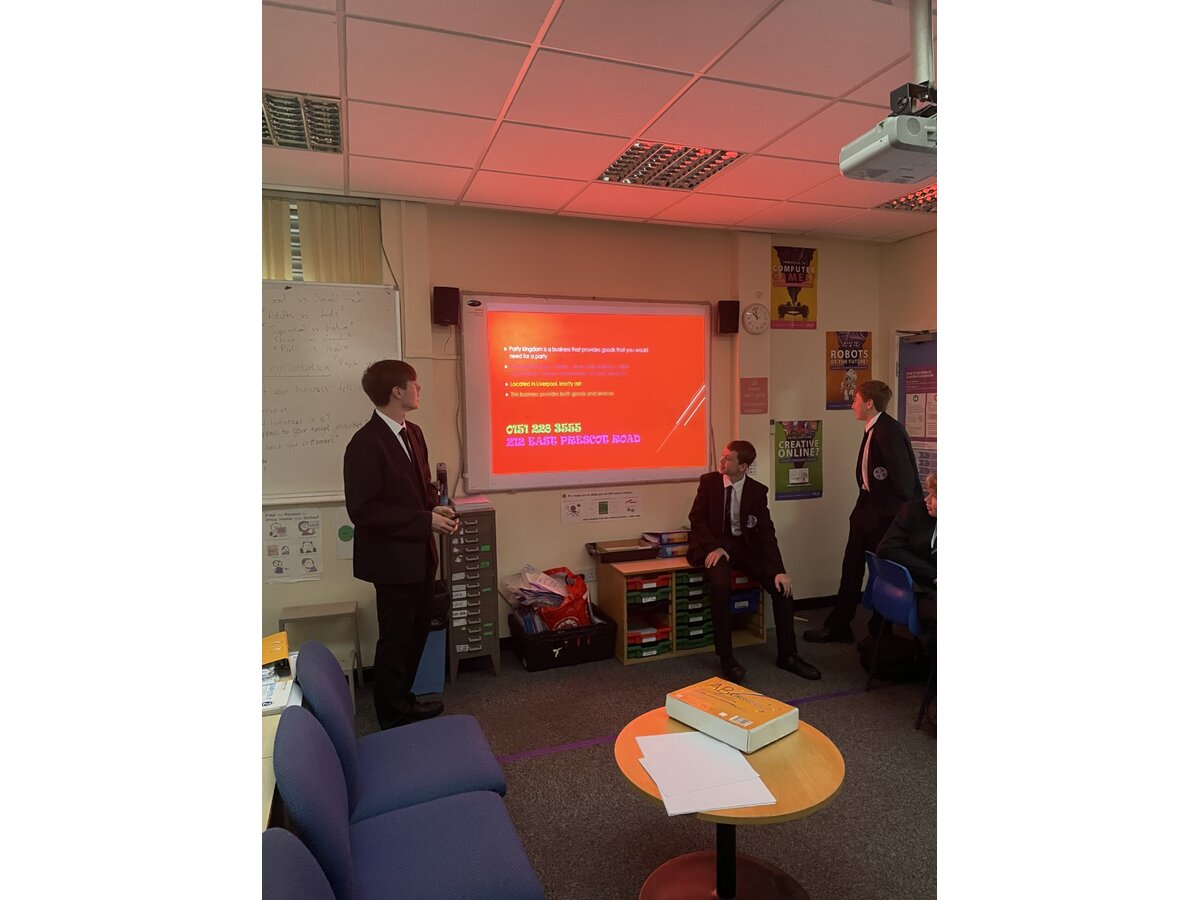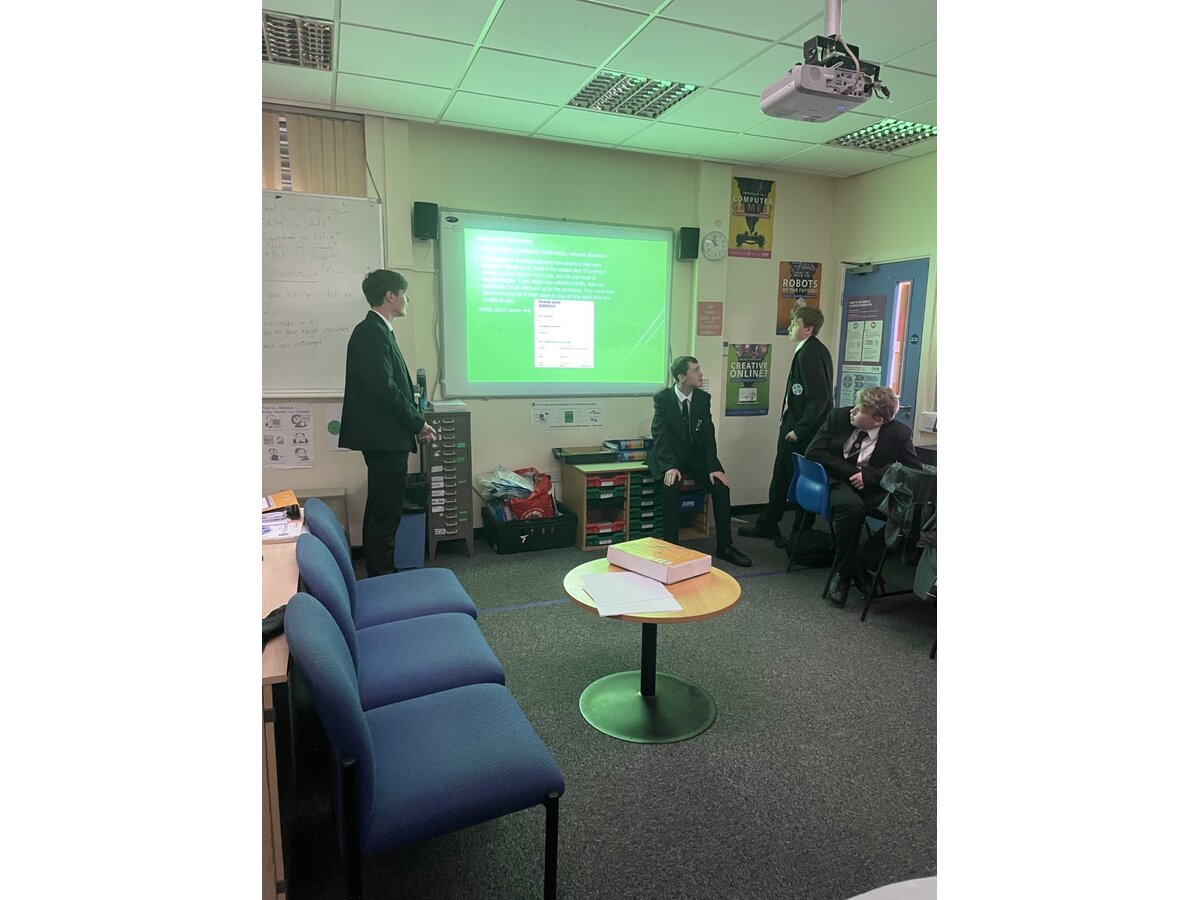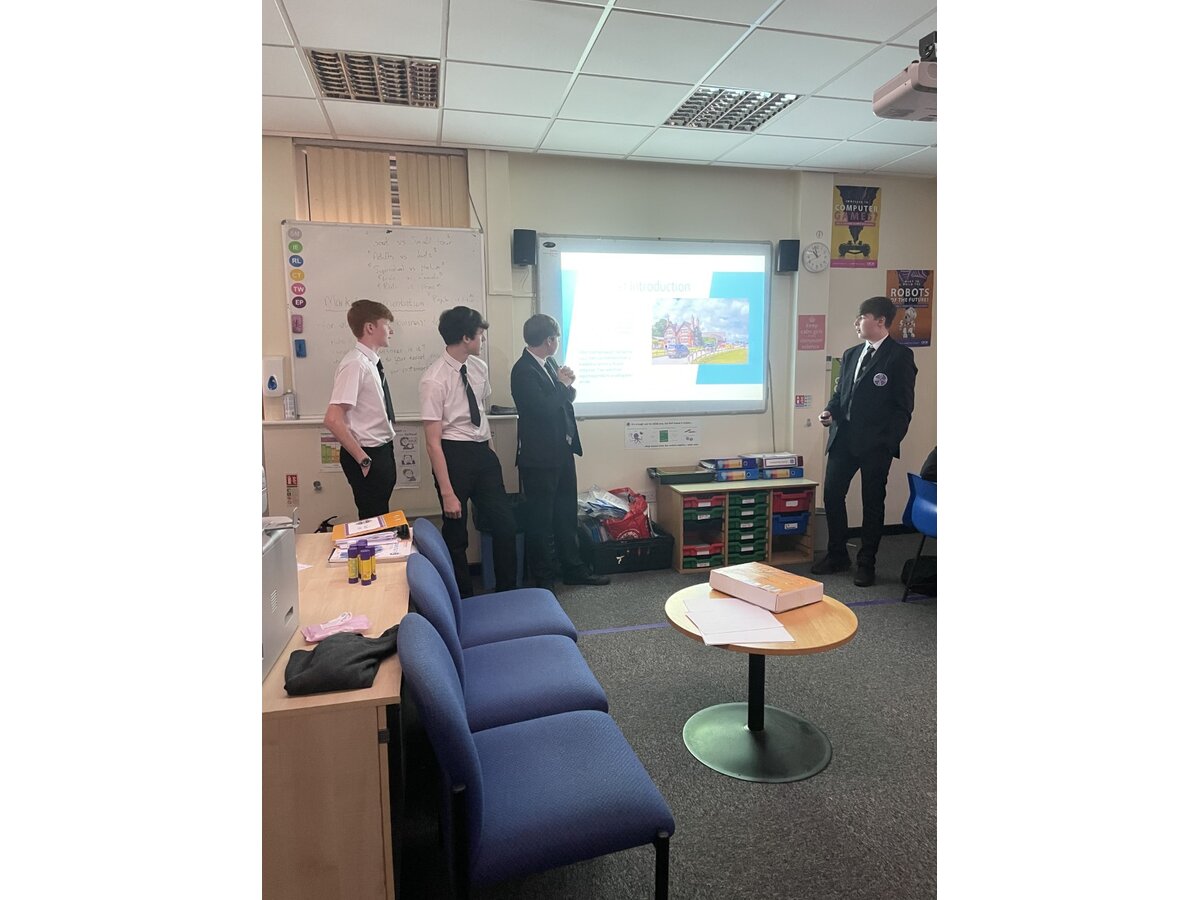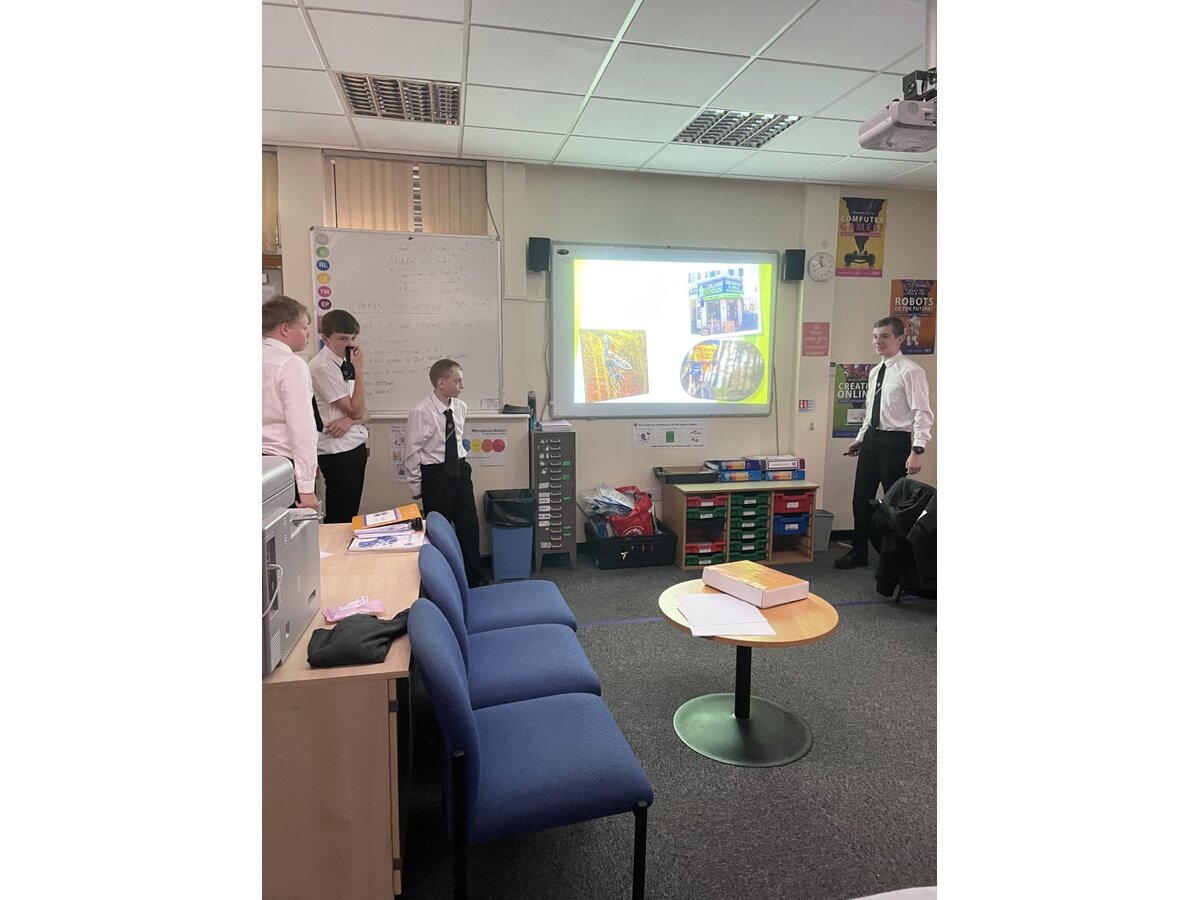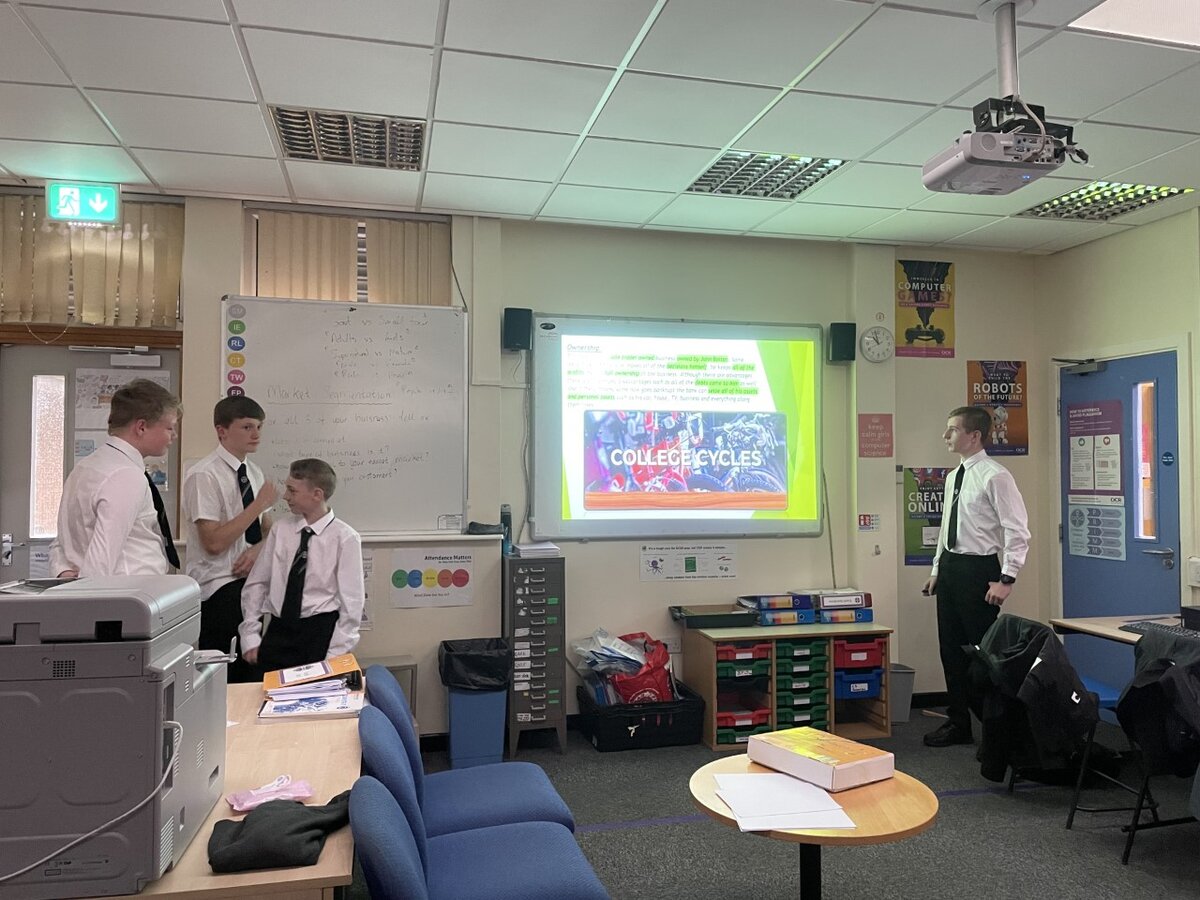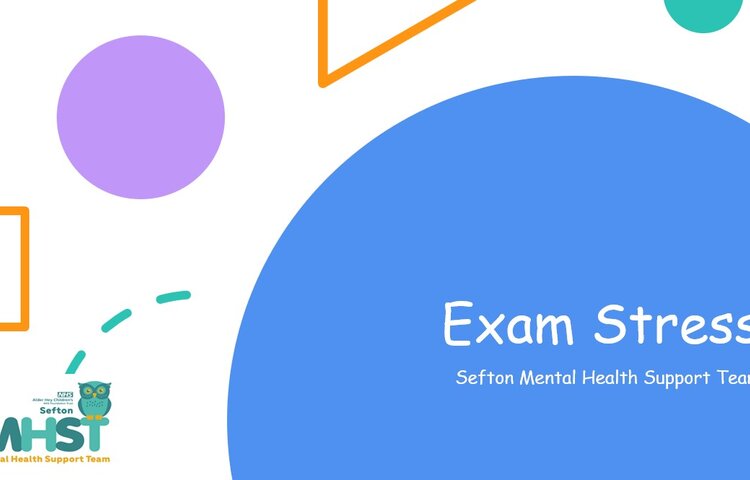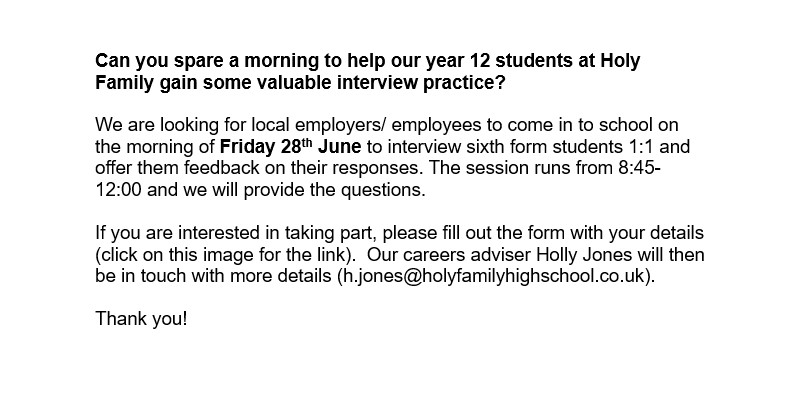Business Studies
Head of Department - Mr. M. Kinsella
Statement of Intent
It is the vision and aims for the Business Studies Department at HFCHS to provide opportunities through a rigorous curriculum to develop commercial minded and enterprising individuals. Business Studies should enable pupils to:
- Know about entrepreneurs – some well-known and other more local and less well known.
- Understand what makes a successful entrepreneur.
- Develop an awareness of their enterprise capabilities so that they are able to consider owning their own business as an alternative career path. They should also be equipped with the employability skills needed for the changing world of work and entrepreneurship.
- Meet with adults other than teachers to have real life examples and knowledge about business in the real world therefore challenging and enriching the pupils’ vocational opportunities.
- Develop knowledge and understanding of business and economic concepts and terms. - Develop knowledge and understanding of their role in business and as a wider part of society and the economy.
- In addition to learning about business theory and calculations, pupils will be required to consider the health, social, moral and ethical issues surrounding business decisions and the impact that businesses can have on a wide range of stakeholders.
- Develop an interest in current business and economic affairs by reading widely around the subject in newspapers and magazines, as well as watching business related television programmes.
The Business Studies curriculum at HFCHS is highly ambitious and designed to give all pupils the necessary knowledge and skills they need to live in the business orientated world in which we live. It has also been designed to prepare pupils who which to pursue both academic and vocational Level 3 courses in business and related areas for those who wish to begin an apprenticeship in the field of business.
The Business curriculum is planned to develop knowledge and understanding of financial literacy. Pupils have opportunities to develop their financial awareness and to master the skills needed to analyse and interpret financial documents.
The department has a clear plan for what pupils should know and be able to do in Business by the end of KS4. Pupils are expected to be able to talk and write knowledgeably about business, enterprise and the economy, using subject specific language accurately and confidently. They should be able to utilise Business specific skills such as making links between different units of work; analysing and interpreting business case studies and understanding financial information and language.
Implementation
GCSE Business Studies and BTEC Enterprise are optional subjects for Year 10 and 11. The Tech award Level 1 / 2 course was introduced in September 2022 as a way to ensure that all learners had access to a Business themed curriculum and to stop the narrowing of the curriculum. Offering GCSE Business Studies and the BTEC Enterprise course allow pupils to choose a course that meets their needs depending on their preferred style of assessment. There are currently one GCSE group and 2 BTEC groups in Years 10 and 11. All GCSE Business Studies and BTEC Enterprise classes are managed and taught by a Business specialist and have 5 hours of lessons over a 2-week cycle. This model means that the KS4 courses meets the minimum requirements of 120 learning hours.
OCR Technicals Level 3 Business is very popular in 6th Form due to the high numbers studying the subject at KS4. Learners will have access to a combination of external testing as well as controlled assessment modules to help them successfully pass the course. The course has total guided learning hours of 360 and is delivered over 2 years with learners accessing 9 lessons every 2 weeks. The learners are required to conduct supervised study periods outside of the lessons to develop independent learning skills.
The Curriculum is coherently planned and sequenced over 2 years in order to introduce key ideas and the concepts, skills and terminology of the business world. Pupils learn about what an enterprise is, and a number of entrepreneurs. This supports cultural, capital moral and cross curricular learning as well as whole school strategies such as wider reading. Pupils use their knowledge and skills to run their own mini-enterprise as part of the GCSE course, learners on the BTEC course plan their own enterprise and pitch their idea.
There is a clear logic to the sequencing as to what is taught, and the order in which it is taught to ensure all pupils learn the expected/essential Business Studies key knowledge and skills. Pupils are expected to be able to use subject specific language to write and talk about the different areas of Business and the economy.
Higher level vocabulary is explicitly taught and modelled by teachers. Pupils are expected to use technical language in both oral and written answers. Classroom displays contain key vocabulary for the unit of work being studied and the learning and testing of vocabulary is a routine part of Business lessons in both GCSE and BTEC lessons. The Business classroom is well equipped and supportive of high-quality teaching and learning. Classroom displays are used to enhance learning through being a visual prompt for information and also promoting high expectations of standards of work.
The Business curriculum is reviewed on an annual basis. However, teaching and learning resources are reviewed and amended on a daily basis as a result of the assessment of the learning taking place in lessons and pupils understanding and enjoyment. Over recent years more time has been spent on developing careers education with a focus on local enterprise in the Business Studies curriculum and there is now evidence of this in both the BTEC and GCSE courses at Key Stage 4 & 5.
Teaching in Business Studies ensures that pupils are enabled to remember work for the long term. Both formative and summative assessment are used at different stages throughout the curriculum to assess the knowledge and understanding of the pupils, not only subject knowledge but their understanding of what each type of exam question response requires them to do. This is used to monitor pupil progress and inform future learning. Pupils complete work individually, and also develop their enterprise capabilities by working in pairs and small groups. They also have to conduct research with adults in order to find out real examples of the content we are covering. Through the use of documentaries, the content of the course is also covered. For the BTEC course for KS learners have to study two businesses in depth, one which they visit and BTEC Learners in KS5 they will visit and study 3 local businesses.
Questioning in lessons and written class and homework allow the teacher to judge whether learning of subject knowledge is secure. Tests taken at the end of units of work and through the Year 10 and 11 exams allow pupils and teachers to gain a more holistic understanding of if pupils understand the content and can apply this understanding to the case studies. By the end of KS4 & 5 learners will be aware of the main types of business ownership and the work done by the main functions in a business: Finance, Human Resources, Marketing, and Production. They will also be aware of the impact of the external business environment and more modern themes such as ethics and sustainability. They are able to identify, explain, analyse and evaluate the different areas of the specification. They are also able to use data to back up their answers.
Impact
Business Studies is a well-constructed, thoughtfully taught subject which has historically led to above average GCSE results. The BTEC course has also allowed learners to be successful in their study. Quality Assurance within the department ensures that the intended curriculum plans are delivered appropriately. There is a planned programme for monitoring and reflecting on provision, including:
• Cooperative planning meetings
• Fortnightly meeting with SLT line manager
• Termly work scrutiny – to look at pupil books as a department and compare/monitor standards of pupil work All of the above is designed to ensure there is no mismatch between the planned and delivered curriculum in lessons delivered by different members of staff.
An element of curiosity and enjoyment is introduced from the very first Business lesson and continues throughout Key Stage 4 & 5, not only coming from the teaching staff but also from outside visits and visitors that are invited into school to present to pupils. These include a local leisure business and lawyers. Business Studies has been both a popular and successful GCSE and BTEC Level 1 / 2 & 3 at both KS4 & 5 at HFCHS.
The majority of GCSE Business pupils go on to study Business related course within the 6th Form we offer or local colleges and usually study A ‘Level Business Studies, Economics or Accounting or continue with a vocational pathway and do a Level 3 BTEC courses. A number have applied for Business related Apprenticeships. Informal feedback from pupils (from thank you cards and comments from parents at parents’ evenings) suggests that pupils enjoy the subject and value the knowledge and understanding they get from the course. After pupils have completed their Business Education, they leave HFCHS Business Department much more informed about the world in which they live. They are able to offer better informed opinions on their future based on the development of their commercial minds and the enterprise capabilities they have developed.
Key Stage 4 Business Studies
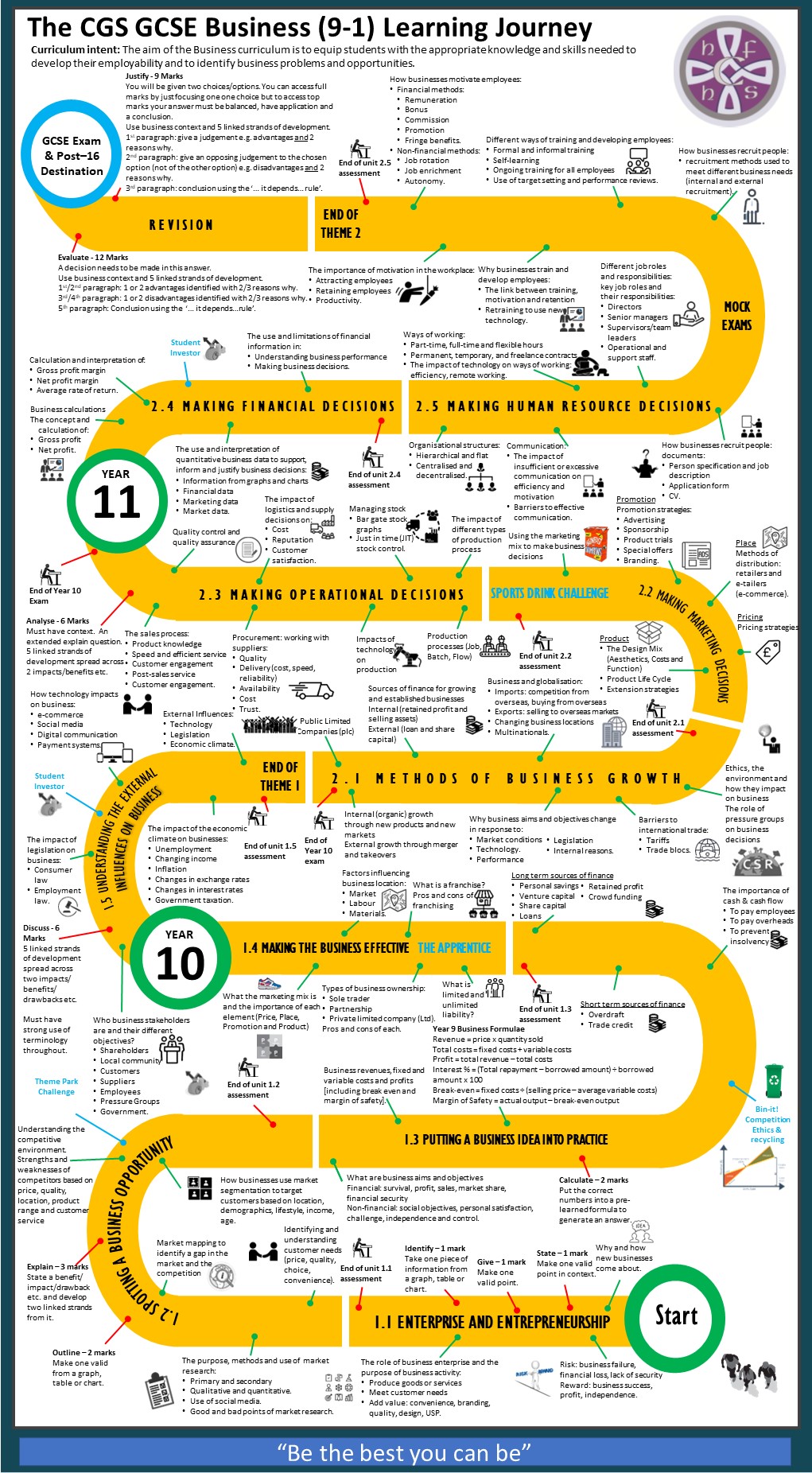
GCSE Business Studies is assessed over 2 examination papers:-
Theme 1 concentrates on the key business concepts, issues and skills involved in starting and running a small business. It provides a framework for students to explore core concepts through the lens of an entrepreneur setting up a business.
In this theme, students will be introduced to local and national business contexts and will develop an understanding of how these contexts impact business behaviour and decisions. Local contexts refer specifically to small businesses or those operating in a single UK location and national contexts relate to businesses operating in more than one location or across the UK.
Theme 2 examines how a business develops beyond the start-up phase. It focuses on the key business concepts, issues and decisions used to grow a business, with emphasis on aspects of marketing, operations, finance and human resources. Theme 2 also considers the impact of the wider world on the decisions a business makes as it grows.
In this theme, students will be introduced to national and global business contexts and will develop an understanding of how these contexts impact business behaviour and decisions. National contexts build on those in Theme 1 and relate to businesses operating in more than one location or across the UK. Global contexts relate to non-UK or transnational businesses.
Course structure for Years 10 - 11
| Theme 1: Investigating small businesses | |
| Written examination: 1 hour and 30 minutes | |
| 50% of the qualification | |
| 90 marks | |
| Content overview | |
| Topic 1.1 Enterprise and entrepreneurship | Year 10 |
| Topic 1.2 Spotting a business opportunity | |
| Topic 1.3 Putting a business idea into practice | |
| Topic 1.4 Making the business effective | |
| Topic 1.5 Understanding external influences on business | |
| Theme 2: Investigating small businesses | |
| Written examination: 1 hour and 30 minutes | |
| 50% of the qualification | |
| 90 marks | |
| Content overview | |
| Topic 2.1 Growing the business | Year 11 |
| Topic 2.2 Making marketing decisions | |
| Topic 2.3 Making operational decisions | |
| Topic 2.4 Making financial decisions | |
| Topic 2.5 Making human resource decisions | |
What is this course about?
Theme 1 comprises five topic areas.
- Topic 1.1 Enterprise and entrepreneurship – students are introduced to the dynamic nature of business in relation to how and why business ideas come about. They also explore the impact of risk and reward on business activity and the role of entrepreneurship.
- Topic 1.2 Spotting a business opportunity – students will explore how new and small businesses identify opportunities through understanding customer needs and conducting market research. They will also focus on understanding the competition.
- Topic 1.3 Putting a business idea into practice – this topic focuses on making a business idea happen through identifying aims and objectives and concentrating on the financial aspects.
- Topic 1.4 Making the business effective – students will explore a range of factors that impact on the success of the business, including location, the marketing mix and the business plan.
- Topic 1.5 Understanding external influences on business – students are introduced to a range of factors, many of which are outside of the immediate control of the business, such as stakeholders, technology, legislation and the economy. Students will explore how businesses respond to these influences.
Theme 2 comprises five topic areas.
- Topic 2.1 Growing the business – students are introduced to methods of growth and how and why business aims and objectives change as businesses evolve. The impact of globalisation and the ethical and environmental questions facing businesses are explored.
- Topic 2.2 Making marketing decisions – students will explore how each element of the marketing mix is managed and used to inform and make business decisions in a competitive marketplace.
- Topic 2.3 Making operational decisions – this topic focuses on meeting customer needs through the design, supply, quality and sales decisions a business makes.
- Topic 2.4 Making financial decisions – students will explore the tools a business has to support financial decision making, including ratio analysis and the use and limitation of a range of financial information.
- Topic 2.5 Making human resource decisions – growing a business means that decisions relating to organisational structure, recruitment, training and motivation need to be made to influence business activity. These aspects are considered in this final topic.
Is this course right for me?
Learners will want to have an interest in Business and possibly the idea of wanting to have a career based in this area. As the course requires a high demand of written coursework, you will be required to have a good standard of written English with the ability to work independently
How will I be assessed?
The course has 2 external exams. Both exams will take place in June Year 11. Each exam is worth 90 marks and will last 90 minutes.
Progression and career opportunities
Study of the qualification as part of Key Stage 4 learning will help learners to make more informed choices for further learning, either generally or in this sector. The choices that a learner makes post-16 will depend on their overall level of attainment and their performance in the qualification.
Learners who generally achieve at Level 2 Grade 4 in this subject can:-
- Study A Levels as preparation for entry into higher education in a range of subjects
- Study of a vocational qualification at Level 3, such as a BTEC National in Business, which prepares them to enter employment or apprenticeships, or to move on to higher education by studying a degree in the business sector.
How can I find out more about the course?
Speak to a Business Studies teacher
They will be located in the rooms in T13, and T2.
Subject leader of Business Mr M Kinsella who is based in T12 and is happy to answer any questions that students may have.
Useful Links to help with the course
In order to find out more information about the course you can search the Edexcel website GCSE 9 - 1 Business Studies
GCSE Business Studies Year 10 Curriculum Map
|
Term |
1 |
2 |
3 |
|
4 |
5 |
6 |
|
|
Year 10 |
Many topics are covered in the first three terms. All topics follow a logical order and therefore provide continuity in the topics. Each change in topic furthers student understanding of the last topic.
Theme 1: Investigating small business
Topic: 1.1 Enterprise and Entrepreneurship This is the beginning of the GCSE and focuses on the dynamic nature of business in relation to how and why business ideas come about. Risk and reward are also explored and the role of entrepreneurship.
Topic 1.2 Spotting a business opportunity. This topic will explore opportunities of business ideas through understanding customer needs and the competition and conducting market research.
Topic 1.3 Putting a business idea into practice. This topic focuses on making the business idea happen. Pupils will focus on identifying their aims and objectives and the financial aspects that come with starting a business.
1.4 Making the business effective. How do you make a business successful? Pupils will look at the next stage of having a new business. Pupils explore the factors that impact on the success of the business, including location, the marketing mix and the business plan. This topic will continue into Term 4. Pupils will sit regular classroom unit assessments to ensure they are retaining the knowledge and can apply their learning to businesses. This will happen consistently throughout the whole course.
|
3 end of topic assessments of each term and 1 synoptic assessment covering 3 topics in Term 3 (skills assessed focus on knowledge and command verbs) |
Topic 1.4 Making the business effective is continuing from Term 3.
How do you make a business successful? Pupils will look at the next stage of having a new business. Pupils explore the factors that impact on the success of the business, including location, the marketing mix and the business plan. |
Topic 1.5 Understanding external influences on business. Pupils finish Theme 1 by being introduced to a range of factors, many are outside the business factors, that effect your business and this topic explores how businesses respond to these influences.
Pupils complete a project or large case study where they can apply their learning and knowledge from this year to an actual business. This ensures pupils are retaining and understand the concepts that have been taught over the year.
Pupils will practice exam strategies and questions to ensure they are exam ready for assessment 2. |
2 end of topic assessments of each term and 1 synoptic assessment covering 5 topics in Term 6 (This will be a past exam paper) |
|||
|
Term |
1 |
2 |
3 |
4 |
5 |
6 |
|
Key Knowledge
|
1.1.1. The dynamic nature of business 1.1.2 Risk and reward 1.1.3 The role of business enterprise
|
1.2.1 Customer needs 1.2.2 Market research 1.2.3 Market segmentation 1.2.4 The competitive environment
|
1.3.1 Business aims and objectives 1.3.2 Business revenues, costs and profits 1.3.3 Cash and cash flow 1.3.4 Sources of business finance
|
1.4.1 The options for start-up and small businesses 1.4.2 Business location 1.4.3 The marketing mix 1.4.4 Business plans |
1.5.1 Business stakeholders 1.5.2 Technology and business. 1.5.3 Legislation and business 1.5.4 The economy and business 1.5.5 External influences |
Tasks focusing on topics 1.1 -1.5 for synoptic understanding of topic integration |
|
Key skills |
Develop an understanding of how these contexts impact on business behaviour: - Use business terminology to identify and explain business activity - Apply business concepts to familiar and unfamiliar contexts |
Understand that there is a range of ways of conducting market research focussing on: - Primary research methods, secondary research methods and data interpretation from qualitative and quantitative research |
Calculations and interpretations in a business context, including: -percentages and percentage changes, averages, revenue, costs and profit, break even, cash-flow forecasts, including total costs, total revenue and net cash flow |
Apply knowledge and understanding to different business contexts. These include businesses ranging from small enterprises to large multinationals and businesses operating in local, national and global contexts |
Investigation into the external environment and how it impacts on business behaviour, including:- Internal and external stakeholders, impact on e-commerce on business, commercial law, monetary and fiscal policy
|
Synoptic understanding of how all topics delivered integrate within the business environment |
|
Task assessments |
Assessment 1 – 3 Multiple choice questions at end of each topic x 3 Command verb assessed state, identify, outline, explain |
Assessments 4 – 7 Multiple choice questions at end of each topic x 4 Command verb assessed state, identify, outline, explain |
Assessments 8 – 11 Multiple choice questions at end of each topic x 4 Command verb assessed state, identify, outline, explain, calculate |
Assessments 12 - 15 Multiple choice questions at end of each topic x 4 Command verb assessed state, identify, outline, explain, discuss, analyse |
Assessments 16 - 20 Multiple choice questions at end of each topic x 5 Command verb assessed state, identify, outline, explain, discuss, analyse |
Synoptic task
|
|
Cross curricular links |
Literacy PSHE Enterprise SEN Wider reading
|
Literacy Numeracy ICT SEN Wider reading |
Numeracy Financial management PSHE SEN Wider reading |
Geography Numeracy Literacy Design Technology SEN Wider reading |
ICT PSHE Careers Numeracy SEN Wider reading |
|
GCSE Business Studies Year 11 Curriculum Map
|
Term |
1 |
2 |
3 |
4 |
5 |
|||
|
Year 11 |
The topics covered this year are extensions of the learning from Year 10. There are some new topics which coincide with running a successful business. As in Year 10, all topics follow a logical order and provide continuity in learning.
Theme 2: Building a business
Topic 2.1 Growing the business. This topic moves forward as if the business that would have been started in Year 10 was open and running well. This focuses on the methods of growth and how and why business aims and objectives change as businesses evolve. This topic also looks at the impact that globalisation of a business has on the ethical and environmental questions facing businesses are explored. Pupils will regularly practice exam questions and recap learning to ensure their recall of the knowledge taught is retained and applied. This will continue through Year 11 and prepare pupils for official mock exams. |
1 end of topic synoptic assessment covering 5 topics in from Year 10 and 1 topic from Year 11 Term 1 |
Topic 2.2 Making Marketing Decisions. Pupils will build on a topic covered briefly in Year 10 and extend their understanding of how the marketing mix is managed and used to inform and make business decisions in a competitive market.
Topic 2.3 Making Operational Decisions. The focus moves to the customer needs in this topic and pupils will look at how to meet the needs of customers by concentrating on design, supply, quality and sales decisions. |
1 end of topic synoptic assessment covering 5 topics in from Year 10 and 3 topics from Year 11 Terms 1 & 2 |
Topic 2.4 Making Financial Decisions. In this topic pupils will focus on how to keep the business trading successfully which is why the emphasis switches to the financial tools to enable an owner to do this. The tools explored are ratio analysis and the use and limitations of a range of financial information.
Topic 2.5 Making Human Resource Decisions. The course finishes on how a business grows by making decisions that relate to organisational structure, recruitment, training and motivation of employees, which all influence business activities. Pupils will spend some time applying the knowledge from the course to business case studies. Pupils will then start revision and exam strategies and practice. |
(Mock assessment in January covering Topics 7 topics) 1 end of topic synoptic assessment covering all 10 topics in from Year 10 and Year 11 |
Revision and past paper practice to embed knowledge, apply skills and refine command verb practice |
|
|
Term |
1 |
2 |
3 |
4 |
5 |
6 |
|
Key Knowledge
|
2.1.1 Business growth 2.1.2 Changes in business aims and objectives 2.1.3 Business and globalisation 2.1.4 Ethics, the environment and business |
2.2.1 Product 2.2.2 Price 2.2.3 Promotion 2.2.4 Place 2.2.5 Using the marketing mix to make business decisions 2.3.1 Business operations 2.3.2 Working with suppliers 2.3.3 Managing quality 2.3.4 The sales process |
2.4.1 Business calculations 2.4.2 Understanding business performance 2.5.1 Organisational structures 2.5.2 Effective recruitment 2.5.3 Effective training and development 2.5.4 Motivation |
Revision “Walk and Talk” Mock exam Timed Exam
Tasks focusing on topics 1.1 – 2.5 for synoptic understanding of topic integration |
Exams |
|
|
Key skills |
The impact of globalisation and the ethical environmental considerations and social effects of business growth are explored |
Problem-solving and decision-making skills relevant to business Analytical and justification skills Quantitative skills calculations in a business context Interpretation and use of quantitative data in business context to support, inform and justify Communication and interpersonal skills |
Business calculations, the concept and calculation of: gross profit, net profit, gross profit margin, net profit margin, average rate of return. The use and interpretation of quantitative business data to support, inform and justify business decisions: information from graphs and charts, financial data, marketing data, market data. Being able to analyse, justify and evaluate data and information from text
|
Synoptic understanding of how all topics delivered integrate within the business environment |
Exams |
|
|
Task assessments |
Assessments 17 - 20 Multiple choice questions at end of each topic x 4 Command verb assessed state, identify, outline, explain, discuss, analyse, Justify |
Assessments 21 - 29 Multiple choice questions at end of each topic x 9 Command verb assessed state, identify, outline, explain, discuss, analyse, Justify |
Assessments 30 - 35 Multiple choice questions at end of each topic x 6 Command verb assessed state, identify, outline, explain, calculate, discuss, analyse, Justify, Evaluate |
Past papers Multiple choice Synoptic questions covering all 10 topics Command verb assessed state, identify, outline, explain, calculate, discuss, analyse, Justify, Evaluate |
Exams
|
|
|
Cross curricular links |
Geography Literacy PSHE Enterprise SEN Wider reading
|
Design Technology Enterprise Literacy Numeracy ICT Geography SEN Wider reading |
Numeracy Financial management PSHE Geography Numeracy SEN Wider reading |
Synoptic cross curricular links SEN Wider reading |
Exams |
|
Level 1/2 Tech Award Enterprise
Introduction
Level 1/Level 2 Tech Award in Enterprise (603/1916/1), is for learners who wish to acquire knowledge and skills through vocational contexts by studying the knowledge, behaviours and skills related to researching, planning, pitching and reviewing an enterprise idea as part of their Key Stage 4 learning. The qualification enables learners to develop their technical skills, such as market research skills, planning, promotional and financial skills using realistic work scenarios, and personal skills, (such as monitoring own performance, time management and problem solving) through a practical and skills-based approach to learning and assessment. Learners will acquire knowledge, understanding and skills to underpin their practical activities in assessment, which will complement their GCSEs.
Course structure for Years 9 - 11
| Component No. | Title | Submission |
| 1 | Exploring enterprises | December Yr 10 |
| 2 | Planning for and pitching an enterprise activity | November Yr 11 |
| 3 | Finance for enterprise | January and May Yr 11 |
Component 1: Exploring enterprises
In this component, you will have the opportunity to develop knowledge and understanding of the different types of enterprise and their ownership, looking at the characteristics of small and medium enterprises (SMEs) and entrepreneurs with reasons for levels of success. You will understand the importance of having a clear focus on the customer and the importance of meeting their needs. Enterprises can struggle if they do not carry out market research. It is important for you to develop relevant skills in market research and to analyse and be able to interpret your findings to support your understanding of customers and competitors.
You will explore why enterprises are successful, looking at the impact of factors both inside and outside the control of the enterprise, and investigate ways in which situational analysis can be used to support decision making. You will discover how success can be monitored in an SME.
This component will give you an understanding of the factors that contribute to a successful enterprise. You will develop transferable skills, such as research and data analysis, which will support your progression to Level 2 or 3 vocational or academic qualifications.
Component 2: Planning for and pitching an enterprise activity
If you are going to succeed as an entrepreneur or as an innovator in business, you need to have great ideas and plan how you are going to put them into practice. Any enterprise needs to plan how it will succeed through working out how it can harness physical, financial and human resources – which means the skills that you and others bring. An entrepreneur will also have to pitch their ideas to an audience in order to secure funding.
In this component, you will use the research knowledge gained from Component 1 to consider a number of ideas before developing a plan for a realistic micro-enterprise activity. You will have the opportunity to plan how best to set up the chosen enterprise and how to fund it. You will need to take responsibility for creating and then delivering a pitch for your developed idea to an audience using your knowledge of business, and demonstrating entrepreneurial characteristics, qualities and skills. In the final part of the component you will use feedback to review your plan and pitch for the micro-enterprise activity, reflecting on your plan, your pitch and the skills you demonstrated when pitching.
Component 3:
The performance of an enterprise can be affected by both internal and external factors. To monitor and improve an enterprise’s performance, you need to be aware of the impact of these factors and the strategies you can use to make the most of opportunities and minimise any threats.
In this component, you will assess and analyse financial information in an enterprise context to monitor the performance of an enterprise and strategies to improve its performance. You will investigate cash flow forecasts and statements, exploring the effects that positive and negative cash flow can have on an enterprise, and suggesting ways to improve them. You will consider the different elements of the promotional mix in order to be able to identify target markets and put forward strategies that enterprises can use to increase their success in the future.
What is this course about?
Tech Award Level 1 / 2 Subsidiary in Enterprise will prepare you progress into employment of for further study in a Business related A Level. The course is equivalent to one GCSE.
Learners are assessed through 3 units requiring them to complete a high demand of coursework but with 1 external examination. As well as further education it can lead to roles in departments such as Finance, Operations Management, Distribution, Marketing and Human Resource Management.
Is this course right for me?
Learners will want to have an interest in Business and possibly the idea of wanting to have a career based in this area. As the course requires a high demand of written coursework, you will be required to have a good standard of written English with the ability to meet deadlines.
How will I be assessed?
The course is has 3 components. 2 coursework based component and 1 examination. Each component will require you to complete a number of tasks based on the unit topic. All components will be graded at levels Pass, Merit and Distinction this will then be converted into a GCSE Level Grade 1 - 9
Progression and career opportunities
Study of the qualification as part of Key Stage 4 learning will help learners to make more informed choices for further learning, either generally or in this sector. The choices that a learner makes post-16 will depend on their overall level of attainment and their performance in the qualification.
Learners who generally achieve at Level 2 across their Key Stage 4 learning might consider progression to:
- A Levels as preparation for entry into higher education in a range of subjects
- study of a vocational qualification at Level 3, such as a BTEC National in Enterprise and Entrepreneurship, which prepares them to enter employment or apprenticeships, or to move on to higher education by studying a degree in the business sector.
How can I find out more about the course?
Speak to a Business Studies teacher
They will be located in the rooms in T13, and T2.
Subject leader of Business Mr M Kinsella who is based in T12 and is happy to answer any questions that students may have.
Useful Links to help with the course
In order to find out more information about the course you can search the Tech Award Level 1 / 2 in Enterprise website
Year 13 OCR Business Curriculum Map
|
Year/Term |
Year 13 Autumn – Spring 1 Term Unit 2 Working in Business |
Year 13 Autumn – Summer 3 Terms Unit HRM |
Year 13 Spring – Summer 2 Terms Unit 17 Responsible Business Practices |
|
Key Knowledge |
This unit will cover the skills and understanding needed to work effectively within a business environment. This includes arranging meetings, working with business documents, making payments, prioritising business activities and communicating with stakeholders. The way that these activities are dealt with will vary according to the specific business protocols in place. Some of these will be specific to a functional area; however, many are common to almost all job roles. |
Gaining an overview of the HR function and learn about factors affecting human resources planning. You will understand the importance of motivating and training employees to achieve their potential and be able to assess the effectiveness of training and development. You will learn how to measure employee performance. You will also understand how and why confidentiality is important for the HR function |
The concept of responsible business practices (sometimes known as corporate social responsibility). How a business manages its activities to produce a positive impact on society. In implementing responsible business practices, a business can be responding to legislation and regulations while some show a commitment to behaving ethically and contributing to economic development and improving the quality of life of the workforce, their families and of the local community |
|
Key Skills |
Personal evaluation and critical thinking are essential to the success of any business and are highly valued in the business world. There will be an understanding as to how vital they are regardless of the role that individuals hold within an organisation. A discovery that all employees are valued and contribute to the success of the organisation |
The management of people and the employment law associated with this. The opportunity to review current work practices within and organisation and assess opportunities for improvement in the management of the work force. There will be skills in reviewing current work practices and looking at ways of identifying and measuring efficiency opportunities. |
Review the impact of different stakeholders on business decisions and how the issues involved can at times be contradictory and difficult to address. You will have the opportunity to explore the social implications of business ethics and corporate responsibilities on a wide range of business activities. This will include topical issues such as whistle blowing, employment practices such as zero-hours contracts, advertising to children, environmental awareness and the use of new technologies. |
|
Task Assessments |
Assessments 1 - 12 Multiple Choice questions at end of each topic. Extended essay questions to reinforce learning. Command verb state, identify, explain, analyse and evaluate |
There are: 10 Pass Criterion 4 Merit Criterion 2 Distinction criterion |
There are: 6 Pass Criterion 4 Merit Criterion 2 Distinction criterion |
|
Cross curricular links |
Literacy
PSHE
Enterprise
Mathematics
English
|
Literacy PSHE Enterprise Mathematics English RE |
English PSHE Enterprise Geography RE |
|
Whole school strategies |
Wider reading SEN |
Wide reading SEN |
Wider reading Presentations SEN |
Year 12 OCR Business Curriculum Map
|
Year/Term |
Year 12 Autumn – Summer 3 Terms Unit 1 The Business Environment |
Year 12 Autumn – Summer 3 Terms Unit 4 Customers & Communication |
|
Key Knowledge |
Researching the local, regional, national and international businesses. There will be specific focus on organisational structures and their functions and a detailed investigation into what each of the functional areas do within an organisation and their contribution to both internal and external stakeholders. With terminal assessment in June 2023 |
Maintaining links with Knowsley Safari Park the controlled assessment will be investigating both internal and external customers. There will be a requirement to look at the importance of maintaining a secure business environment in relation to information and communication. There will be a requirement to use oracy skills to achieve several of the criterion with a series of customer focussed role play activities to simulate. |
|
Key Skills |
Develop knowledge that business must behave in an ethical way and an awareness that business prime motive is not just financial. There will be evaluative discussions which aim to focus on the impact on business behaviour on the wider community |
To understand the importance that both internal as well as external customer impact the way a business operates and makes decisions. There will be presentations throughout the unit and opportunities to reflect on practice and undertake self assessment activities to focus on personal evaluation and performance. |
|
Task Assessments |
Assessments 1 - 35 Multiple Choice questions at end of each topic. Extended essay questions to reinforce learning. Command verb state, identify, explain, analyse and evaluate |
There are: 10 Pass Criterion 4 Merit Criterion 2 Distinction criterion |
|
Cross curricular links |
Literacy PSHE Enterprise Mathematics English |
English PSHE Enterprise Geography RE |
|
Whole school strategies |
Wider reading SEN |
Wider reading Presentations SEN |
Enrichment
Resources
https://www.aqa.org.uk/subjects/business/applied-general/business
https://www.aqa.org.uk/subjects/business/applied-general/business/planning-resources
https://www.merlinentertainments.biz/
https://www.aqa.org.uk/subjects/business/applied-general/business/planning-resources
Business Studies Career Opportunities
.jpg) |
BUSINESS STUDIES CAREERS
Business Studies Graduates might also enter graduate trainee schemes with large corporate companies. Some graduates go on to study an MBA or qualify in teaching and lecturing. Entrepreneurial graduates might also start their own business.
A business and management studies degree prepares you for a career in business, which may stretch across any sector or industry.
WHERE TO FIND BUSINESS STUDIES JOB ADVERTS
BUSINESS STUDIES DEGREES Subjects to study at A Level: Business Studies is a good fit with most A Level subjects, including Geography, History and Psychology. It is complementary to more creative subjects such as Media Studies and Design and Technology as every career has a business element to it.
Wider reading: BBC Business news websites, the Harvard Business Review magazine and Financial Times. An ability to discuss current business issues, both in the UK and globally is essential.
Over 116 UK universities offer Business Studies. The top 10 UK Universities for Business Studies according to the Complete University Guide are:
|
|
Useful websites:
***TOP TIP*** Business studies courses are varied and can be general or specialist. Courses usually include business economics, organisational behaviour, financial management and control, marketing, human resources, corporate law, business IT, operations management, quantitative methods and accounting. Some courses offer international options whilst others offer specialisation in areas such as retail, marketing and hospitality. Many courses offer a sandwich placement either in the UK or abroad. Other interesting information: According to the Sunday Telegraph, Business and Management were in the top two most popular degree courses for 2014. GRADUATE PROSPECTS According to the Complete University Guide, over two-thirds of business studies graduates are in full-time employment six months after graduation. Of this number, around a fifth work as business and finance professionals in areas such as chartered accountancy, business consultancy, tax, banking, city markets and insurance. Internships and Work Experience: Gumtree recently completed a poll of employers with the results showing that work experience makes you 95% more employable. The good news carries on, two thirds of employers think candidates with work experience were more knowledgeable, 44% think they are more confident and 40% say they are more committed. Useful websites for Business Studies related work placements and internships:
CELEBRITIES WHO STUDIED BUSINESS STUDIES
|
|
